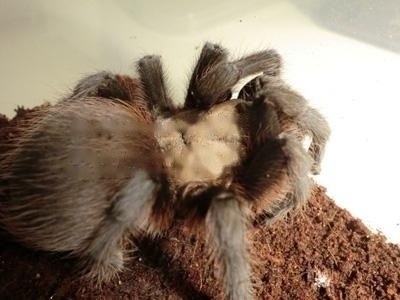
Texas Brown Tarantula
Adult body length is 13-14 cm, suitable temperature is 28-30 ℃, and suitable humidity is 65%. It is recommended to use moist peat, coconut brick and clay as the substrate. It tak
English name:Venezuela tiger tail Spider
Origin: Eastern Venezuelan Rainforest
Venezuela Sun TigerSpider (Latin Scientific name: Psalmopoeus irminia), also known as the Venezuelan tiger-tailed spider, is native to the eastern tropical rainforest of Venezuela, a very striking and classic arboreal type Pets Tarantula species. Compared with the Trinidad tiger tail of the same genus, they are slightly smaller in size, with an adult body length of 15-16+ cm foot span, but they have a darker dark green, a deeper orange-red pattern on the feet, and more pronounced on the abdomen "Tiger Stripes".
Chinese name: Venezuelan sun tiger
Scientific name: venezuelan sun
Family name: aviculariinae
Latin name: Psalmopoeus irminia
Subfamily: Selenocosmiinae
Body size: Adult body size is about 15-17 cm foot spread
Habits: Arboreal will also dig holes, especially in childhood, suitable for temperature 27— -30 degrees, suitable for humidity 75%. Requires higher space.
Compared with the Trinidad tiger tail of the same genus, their body size is slightly smaller and the adult body length 15-16+ cm foot span, but they have a darker dark green, a deeper orange-red pattern on the feet, and a more pronounced "tiger stripe" on the abdomen.
But again, they have a bad temper, and they may be the most aggressive of the genus Strong kind. Usually individuals above 5-6 cm will show aggression. Once they feel that their territory is violated, they will assume a standard defensive posture. Larger individuals will even rub the chelicera so that you can hear a clear "hiss". hiss" sound.
The suitable temperature is 26~28℃, and the suitable humidity is 85%. It is recommended to use moist peat, coconut brick and clay as the substrate. Their larvae are very fast and care should be taken to avoid escape. Placing a bark in the box will give them more room to move around, while also giving them a place to hide. Otherwise, as soon as the feeding box is opened, they may be frightened and they may jump out and disappear in front of you. In terms of feeding, their ferocious nature allows them to dare to attack prey larger than themselves, so usually nothing is in doubt. Quick to move, possibly biting and relatively venomous, they're certainly not one of those breeds for beginners.